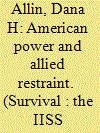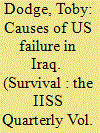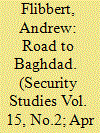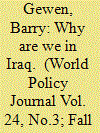| Srl | Item |
| 1 |
ID:
077364


|
|
|
| 2 |
ID:
077362


|
|
|
| 3 |
ID:
077846


|
|
|
| 4 |
ID:
078160


|
|
|
| 5 |
ID:
076992


|
|
|
|
|
| Publication |
2006.
|
| Summary/Abstract |
Why did the Bush administration take the United States to war with Iraq in the aftermath of September 11, 2001? The constructivist approach used in this article to answer this question argues that the ideas of a handful of policy intellectuals affected political outcomes in remarkably consequential ways. These ideas shaped administration assessments of every major aspect of the Iraq war, beginning with its necessity and justification. Although the administration's ideational commitments were complex and evolving, four sets of ideas were central to its risk-filled gambit in the Middle East: a belief in the necessity and benevolence of American hegemony, a Manichaean conception of politics, a conviction that regime type is the principal determinant of foreign policy, and great confidence in the efficacy of military force. Taken together, these ideas defined the social purpose of American power, framed threats to the United States, and determined appropriate solutions to core problems. Ideas are not the sole factors setting the course of u.s. foreign policy, but they are essential to explaining an otherwise puzzling administration decision
|
|
|
|
|
|
|
|
|
|
|
|
|
|
|
|
| 6 |
ID:
078503


|
|
|
|
|
| Publication |
2007.
|
| Summary/Abstract |
Since the Democrats regained control of Congress, the Hill has been alive with the sound of hearings. Congress' earlier slumber and recent awakening should come as no surprise: for the last six decades, the partisan composition of Congress has defined the politics of war. Now facing a Democratic majority, President George W. Bush will find it far more difficult to stay in Iraq
|
|
|
|
|
|
|
|
|
|
|
|
|
|
|
|
| 7 |
ID:
080176


|
|
|